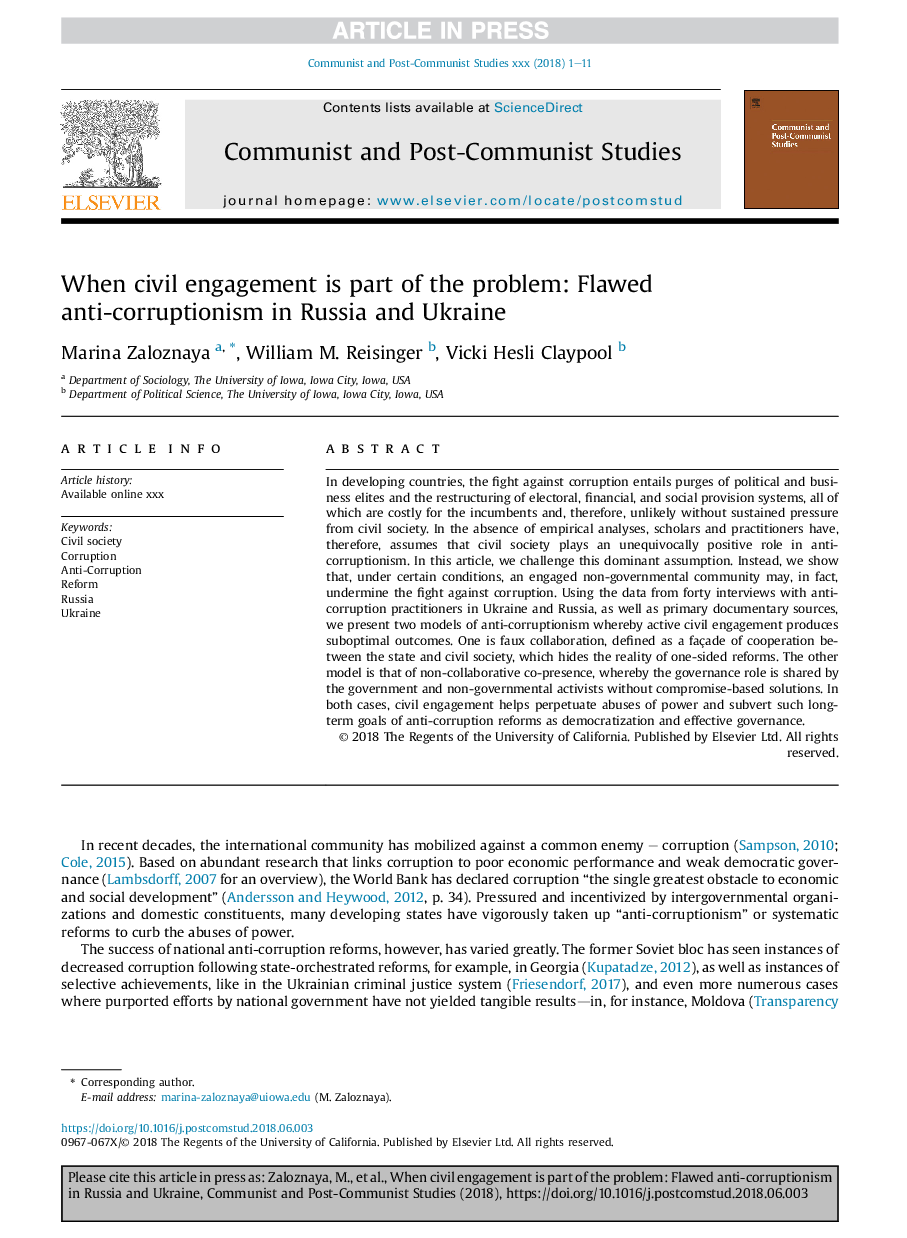| کد مقاله | کد نشریه | سال انتشار | مقاله انگلیسی | نسخه تمام متن |
|---|---|---|---|---|
| 10226945 | 1701318 | 2018 | 11 صفحه PDF | دانلود رایگان |
عنوان انگلیسی مقاله ISI
When civil engagement is part of the problem: Flawed anti-corruptionism in Russia and Ukraine
ترجمه فارسی عنوان
هنگامی که مشارکت مدنی بخشی از مشکل است: ضد فساد اداری ناقص در روسیه و اوکراین
دانلود مقاله + سفارش ترجمه
دانلود مقاله ISI انگلیسی
رایگان برای ایرانیان
کلمات کلیدی
جامعه مدنی، فساد، ضد فساد، اصلاح روسیه، اوکراین،
ترجمه چکیده
در کشورهای در حال توسعه مبارزه با فساد مستلزم تمیز کردن نخبگان سیاسی و تجاری و بازسازی سیستم های نظارت بر انتخابات، مالی و اجتماعی است که همه این هزینه ها برای سرمایه گذاران هزینه می شود و بنابراین بدون فشار مداوم از جامعه مدنی بعید است. بنابراین، در نبود تجزیه و تحلیل تجربی، محققان و متخصصان بر این فرض است که جامعه مدنی نقش عینی در مبارزه با فساد اداری ایفا می کند. در این مقاله، ما این فرض غالب را به چالش می کشد. در عوض، ما نشان می دهیم که در شرایط خاص، یک جامعه غیر دولتی مشغول به کار می تواند در واقع مبارزه با فساد را تضعیف کند. با استفاده از داده های چهل مصاحبه با متخصصان مبارزه با فساد در اوکراین و روسیه و همچنین منابع مستند اولیه، ما دو مدل از مبارزه با فساد اداری را ارائه می دهیم که در آن مشارکت فعال مدنی باعث نتایج غیرمتعارف می شود. یکی از همکاری های فاکس، تعریف شده به عنوان یک رابطۀ بین همکاری بین دولت و جامعه مدنی است که واقعیت اصلاحات یک طرفه را پنهان می کند. مدل دیگر این است که همکاری حضور غیرمستقیم، به این ترتیب نقش حکمرانی توسط دولت و فعالان غیر دولتی بدون راه حل های مبتنی بر مصالحه به اشتراک گذاشته می شود. در هر دو مورد، مشارکت مدنی به مؤثر بودن سوء استفاده از قدرت کمک می کند و اهداف درازمدت اصلاحات ضد فساد را به مثابه ی دموکراتیزه کردن و حکومتداری موثر، زیر پا می گذارد.
موضوعات مرتبط
علوم انسانی و اجتماعی
علوم اجتماعی
توسعه
چکیده انگلیسی
In developing countries, the fight against corruption entails purges of political and business elites and the restructuring of electoral, financial, and social provision systems, all of which are costly for the incumbents and, therefore, unlikely without sustained pressure from civil society. In the absence of empirical analyses, scholars and practitioners have, therefore, assumes that civil society plays an unequivocally positive role in anti-corruptionism. In this article, we challenge this dominant assumption. Instead, we show that, under certain conditions, an engaged non-governmental community may, in fact, undermine the fight against corruption. Using the data from forty interviews with anti-corruption practitioners in Ukraine and Russia, as well as primary documentary sources, we present two models of anti-corruptionism whereby active civil engagement produces suboptimal outcomes. One is faux collaboration, defined as a façade of cooperation between the state and civil society, which hides the reality of one-sided reforms. The other model is that of non-collaborative co-presence, whereby the governance role is shared by the government and non-governmental activists without compromise-based solutions. In both cases, civil engagement helps perpetuate abuses of power and subvert such long-term goals of anti-corruption reforms as democratization and effective governance.
ناشر
Database: Elsevier - ScienceDirect (ساینس دایرکت)
Journal: Communist and Post-Communist Studies - Volume 51, Issue 3, September 2018, Pages 245-255
Journal: Communist and Post-Communist Studies - Volume 51, Issue 3, September 2018, Pages 245-255
نویسندگان
Marina Zaloznaya, William M. Reisinger, Vicki Hesli Claypool,
